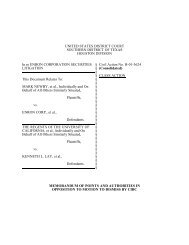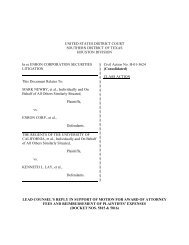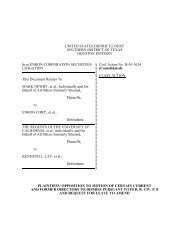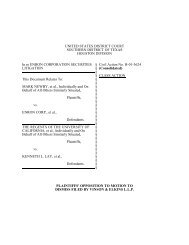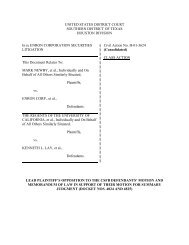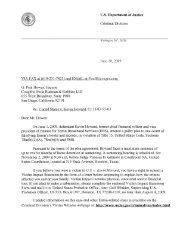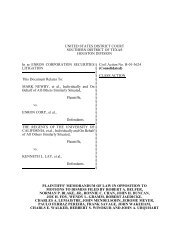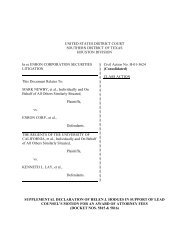Declaration Of Helen J. Hodges In Support Of Lead Counsel's ...
Declaration Of Helen J. Hodges In Support Of Lead Counsel's ...
Declaration Of Helen J. Hodges In Support Of Lead Counsel's ...
You also want an ePaper? Increase the reach of your titles
YUMPU automatically turns print PDFs into web optimized ePapers that Google loves.
and failed to allege loss causation or reliance under Greenberg. See 7/7/06 Opinion and Order re<br />
Motion for Reconsideration (Docket No. 5391) at 44-45.<br />
266. On June 26, 2006, Barclays filed a motion for summary judgment (Docket Nos. 4817,<br />
4818), which argued for judgment because there was no evidence that Barclays committed a primary<br />
violation of §10(b) and Rule 10b-5; plaintiffs’ scheme theory was not supported by the evidence and<br />
was inconsistent with Central Bank and the PSLRA; plaintiffs’ damages theories were invalid as a<br />
matter of law; plaintiffs could not maintain a §10(b) and Rule 10b-5 claim against Barclays PLC or<br />
Barclays Capital <strong>In</strong>c.; and plaintiffs could not maintain a §20(a) control person claim against<br />
Barclays PLC. On January 19, 2007, Barclays filed a supplemental memorandum in support of their<br />
motion (Docket No. 5333), which argued for judgment because there was no evidence that Barclays<br />
committed a primary violation of the securities laws. On February 8, 2007, <strong>Lead</strong> Counsel filed <strong>Lead</strong><br />
Plaintiff’s Opposition to the Barclays Defendants’ Motion for Summary Judgment and Supplemental<br />
Memorandum in <strong>Support</strong> of Motion for Summary Judgment (Docket No. 5385), which totaled 166<br />
pages. The opposition argued against judgment because there existed triable issues of fact<br />
concerning whether: Barclays committed primary acts of deception under Rule 10b-5(a) and (c);<br />
Barclays violated Rule 10b-5(b); Barclays acted with scienter; Barclays’ deceptive conduct was in<br />
connection with a purchase or sale of securities; there was loss causation present; and whether<br />
reliance was present. The opposition also argued against summary judgment because <strong>Lead</strong> Plaintiff<br />
had viable claims as to all the Barclays entities sued. The Court had not issued a ruling on the<br />
motion by the time the case was stayed.<br />
267. On June 26, 2006, Merrill Lynch filed a motion for summary judgment (Docket No.<br />
4816), which argued for judgment because plaintiff could not prove reliance, loss causation or a<br />
primary violation of the securities laws with regard to it, and because Merrill Lynch was not subject<br />
to joint-and-several liability under the law. On November 13, 2006, <strong>Lead</strong> Counsel filed <strong>Lead</strong><br />
- 146 -



